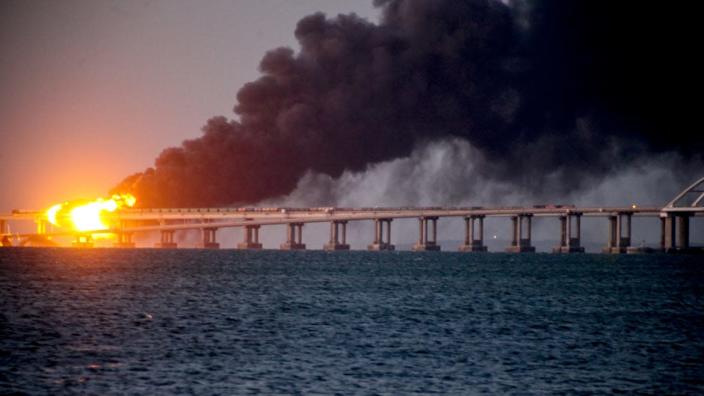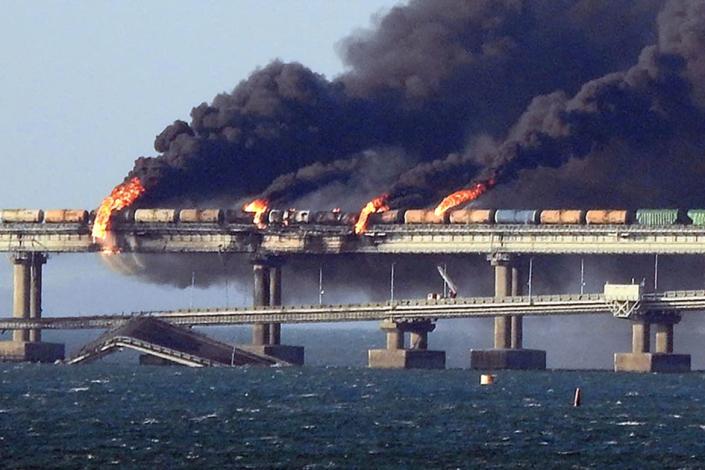We Never Should’ve Laughed at Ukraine

Russia experienced a number of embarrassing setbacks on the battlefield in Ukraine, but none of them were as humiliating as an explosion that rocked the Crimean Bridge, also known as Kerch Strait Bridge or Kerch Bridge, early Saturday morning.
During his Saturday broadcast on Solovyov Live, Russian state TV host Sergey Mardan opened his show with heavy sighs. He noted, “All day long we’ll be talking about how this happened and what will come of it. I can tell you right now that nothing good will come of it, that’s for sure.” Mardan grimly concluded: “They’ve achieved an enormous propagandistic effect.”
Repeatedly referring to Ukrainians with an often-used slur, Mardan complained that Russia apparently underestimated not only them, but also the Americans. Chauvinistic disregard for the Ukrainians as Russia’s “lesser” opponents manifests in the way Russian propagandists tend to blame the West for any painful blows inflicted in the course of Russia’s ill-fated invasion.
Mardan noted: “There was no shock that they would try to attack the Crimean bridge, but there was an initial shock that they managed to pull it off, especially in the early morning hours.” He explained that—as usual—the West is to blame: “Many competent people explain that this was a complicated task—not just journalists or commentators, but specialists. There is a high level of certainty that an operation of this magnitude could have been staged only by Western intelligence agencies.”
Mardan urged the Russians to stop underestimating the Ukrainian Armed Forces, bristling even at the comparisons to ISIS. He asserted: “Comparing Ukraine to ISIS is insulting to the Russian Army, which has been fighting them on an enormous front for seven months… ISIS are tribespeople in sandals made out of tires. They have no cities, power plants, railways or factories. Ukraine has it all. Ukraine is a cruel, motivated, well-prepared enemy. This is an enemy nation that has been waging a full-fledged war against us for at least 7 ½ months. We keep calling it a special military operation, but they are waging war… Good Lord, I can’t keep listening to this thick and sticky rhetoric, it’s time to stop talking about the peace process and the collective West. This rhetoric doesn’t look good—in fact, it’s harmful. Since the mobilization has been announced, we’re talking about war, a people’s war.”

Black smoke billows from a fire on the Kerch bridge that links Crimea to Russia, after a truck exploded, near Kerch.
AFP
Mardan predicted an escalation, quoted Vladimir Lenin and urged a harsh response: “We stand on the precipice of another escalation. It’s unavoidable… A war should be waged for real or not at all. Now we don’t have any other options… No one will allow us to retreat, even though some would like that—and actually want that to happen. We should have no illusions about that.”
He somberly revisited fantasies harbored by many Russians in the very beginning of the invasion, stoked by top propagandists on state television, who predicted that a war against Ukraine would be fast, pain-free and nearly bloodless.
That dream rapidly evaporated and reality hit hard, affecting even the staunch proponents of Putin’s war. Mardan reminisced: “During the first week, we had a naïve expectation of another “Crimean miracle,” like it happened in 2014. There we were, at Kyiv’s door, having solved all problems… That hope was gone 1-2 weeks later.”
Mardan grumbled about the problems Russia continues to have with supplying its existing forces, especially in light of the recently-announced partial mobilization. He outlined the well-known shortages of uniforms, drones and basic gear, which have been replenished through donations and crowdfunding. The host noted that at this point, every grandma in Russia knows what a quadcopter is, having had to contribute funds to supply the Army. Now the citizens are being prepared to skip New Year’s celebrations, to do without Christmas trees or fancy lights adorning city centers—with that money to be sent to the front, securing winter uniforms for the troops. Mardan sternly noted: “This is no time to celebrate.”
He also revealed that not everyone is as receptive to the idea of an indefinite war against Ukraine as Russian public polls alleged. Behind the scenes, many are anxious for the armed conflict to be over. In light of this rapidly growing trend, state TV propagandists have been tasked with convincing the public that unless Russia wins, its citizens would be locked “in concentration camps,” enslaved by the West or killed. Mardan said, “After the mobilization, I noticed the growth of pacifist inclinations in my circles, among the people of my generation or older. Very cautiously, they’re starting to come out and say how nice it would be if everything came to an end, since we’re not pulling through.”

Russian President Vladimir Putin.
ALEXEY DANICHEV
The host proposed that the best strategy to shut down those inclinations was to vividly paint what the future of Russia would look like if it’s defeated in this war. He suggested, “We should be painting the image of defeat with the same colors we used to describe the impending victory back in March, when we were planning a parade on Khreshchatyk [the main street of Kyiv]. I was dreaming about those scenes, as well as some of my colleagues.”
Mardan invited his guest, political commentator Evgeny Norin, to specify what Russia’s defeat would look like. Norin ushered in the historical memories of Russia’s distant past. He opined: “Russia’s defeat would resemble the Mongol yoke, with a modern technological twist… Crimea, Donbas and other contested regions would be taken away, just to put us in our place. From the standpoint of national humiliation, we would be forced to give up Sevastopol. Remember the fate of Serbia and Yugoslavia, who had to give up all of their military and political elites. Of course, many people here would say, ‘So they’ll cut off their heads, no big deal.’ Our soft pacifists say exactly that… Naturally, we’d also be forced to pay an enormous amount of reparations, huge amounts would be taken.”
Mardan and Norin concurred that Russian oligarchs and major companies would find a way not to pay and the cost of reparations would land on everyday citizens. Norin mused that Russia would not be allowed to manufacture anything that is more sophisticated than a foot stool and Western companies would lure away all of the specialists—much as they’re already doing. He predicted: “After the capitulation, we would be unable to offer them anything aside from the joy of standing by your Motherland.”
Norin darkly predicted that Russia’s capitulation “would be like Yugoslavia on steroids,” with decolonization as “a cherry on top.” He said Russia would be forced to break up into at least 10 separate parts, with Sharia law being instituted in at least some of them.
During the same show, State Duma member Alexander Kazakov offered a cheerful imperialistic prediction of what will happen if Russia perseveres and prevails: “If we win, we’ll take back what’s ours and whatever is theirs as well.”
Get the Daily Beast’s biggest scoops and scandals delivered right to your inbox. Sign up now.
Stay informed and gain unlimited access to the Daily Beast’s unmatched reporting. Subscribe now.


